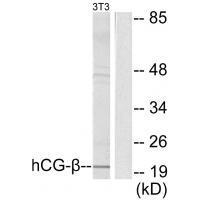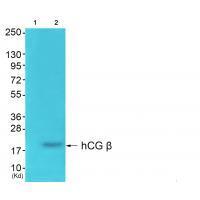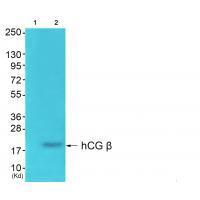


| WB | 咨询技术 | Human,Mouse,Rat |
| IF | 咨询技术 | Human,Mouse,Rat |
| IHC | 1/50-1/100 | Human,Mouse,Rat |
| ICC | 技术咨询 | Human,Mouse,Rat |
| FCM | 咨询技术 | Human,Mouse,Rat |
| Elisa | 咨询技术 | Human,Mouse,Rat |
| Aliases | Choriogonadotropin subunit beta [Precursor] ; CG-beta; Chorionic gonadotrophin chain beta; |
| Entrez GeneID | 1082;93659;94027;94115; |
| WB Predicted band size | 20kDa |
| Host/Isotype | Rabbit IgG |
| Antibody Type | Primary antibody |
| Storage | Store at 4°C short term. Aliquot and store at -20°C long term. Avoid freeze/thaw cycles. |
| Species Reactivity | Human,Mouse |
| Immunogen | Synthesized peptide derived from human hCG β. |
| Formulation | Purified antibody in PBS with 0.05% sodium azide. |
+ +
以下是关于hCG β抗体的3篇代表性文献及其摘要概括:
1. **文献名称**:*Production and characterization of a monoclonal antibody specific to the β-subunit of human chorionic gonadotropin*
**作者**:Berger P, et al.
**摘要**:该研究报道了一种针对hCG β亚基的高特异性单克隆抗体的制备,通过杂交瘤技术筛选出抗体,证实其与hCG β亚基结合,但不与LH(黄体生成素)交叉反应,适用于高灵敏度的妊娠检测和肿瘤标志物检测。
2. **文献名称**:*Targeted cancer therapy using a human anti-β-hCG antibody-drug conjugate*
**作者**:Lapusan S, et al.
**摘要**:研究利用hCG β抗体作为药物载体,构建抗体-药物偶联物(ADC),在表达hCG β的癌症模型中展示出显著抑制肿瘤生长的效果,证明其在癌症靶向治疗中的潜力。
3. **文献名称**:*Development of a sandwich ELISA for quantification of hCG β-core fragment in urine*
**作者**:Cole LA, et al.
**摘要**:开发了一种基于hCG β核心片段抗体的夹心ELISA检测方法,用于定量尿液中的hCG代谢产物,提高了妊娠相关疾病(如葡萄胎)和某些癌症的诊断准确性。
4. **文献名称**:*Structural analysis of hCG β antibody epitopes using phage display*
**作者**:Xia N, et al.
**摘要**:通过噬菌体展示技术解析hCG β抗体的结合表位,发现其关键抗原结合区域,为改进hCG检测试剂和抗体药物设计提供了分子基础。
以上文献涵盖抗体开发、治疗应用、检测方法优化及结构研究,反映了hCG β抗体的多样化研究方向。
Human chorionic gonadotropin (hCG) is a glycoprotein hormone primarily produced during pregnancy by placental trophoblast cells. Its β-subunit (hCGβ) shares structural similarity with the β-subunit of luteinizing hormone (LHβ) but contains a unique 24-amino-acid carboxyl-terminal peptide, making it a specific target for antibody development. hCGβ antibodies are designed to distinguish hCG from other hormones, enabling precise detection in clinical and research settings.
These antibodies emerged as critical tools in reproductive health diagnostics, particularly for early pregnancy tests, where they detect hCG in urine or blood. Beyond pregnancy, hCGβ is ectopically expressed in certain cancers (e.g., trophoblastic tumors, germ cell cancers), and its detection aids in cancer diagnosis and monitoring. hCGβ antibodies also underpin fertility research, such as studying gestational disorders or developing contraceptive vaccines.
Early polyclonal antibodies faced cross-reactivity with LHβ due to shared epitopes. Advances in hybridoma technology led to monoclonal antibodies (e.g., B152. 3G11) with higher specificity for hCGβ, improving immunoassay accuracy. Today, hCGβ-specific antibodies are integral to point-of-care tests, ELISA kits, and automated immunoassay platforms. Recent research explores their therapeutic potential, including antibody-drug conjugates targeting hCGβ-expressing cancers. Challenges remain in optimizing sensitivity, minimizing cross-reactivity, and standardizing assays across diverse biological samples.
×